For the past two years I have made very slow progress in attempting to convince Poole Hospital to open access to their MRI scanners for research purposes. Whilst I had originally responded to an email from them it seems there were not at all ready to deal with my requests. More recently there has been some positive movement on the issue. I am hoping that this technology might interest you. Poole Hospital has three scanners of two field strengths: two at 1.5T and one at 3T, the latter being the standard for neuroimaging, but the former being of use for high-resolution structural scans of people and objects. The applications for this type of technology are many; in psychological research it is used most commonly to get brain scans of patients or to measure brain activity as people perform tasks, but has been used effectively as an analytical tool in Archeology and Sports Science; you will know better than I how this technology has been used in your fields. I am trying to gauge the level of interest in this technology at BU so as to make a better case to BU and to the hospital. Please contact me on bparris@bournemouth.ac.uk if there is utility in the use of this technology in your research or teaching or if there could be in the future.
Category / Creative, Digital & Cognitive Science
Migration to Cloud Computing – The Impact on IT Management and Security
 We would like to invite you to the next research seminar of the Creative Technology Research Centre that will be delivered by Adel Alkhalil.
We would like to invite you to the next research seminar of the Creative Technology Research Centre that will be delivered by Adel Alkhalil.
Title: Migration to Cloud Computing – The Impact on IT Management and Security
Time: 2:00PM-3:00PM
Date: Wednesday 5th February 2014
Room: P302 (Poole House, Talbot Campus)
Abstract: Cloud computing is a new paradigm for emerging technology in computing and IT industries that has had a considerable impact on organisations, not only by increasing the efficiency of acquiring IT resources, but also on IT management roles, organisations strategies, IT projects management, and organisations’ security. This research explores the factors that influence the decision making for cloud migration and the impact on IT management roles through a series of in-depth interviews with cloud-users, security professionals and cloud providers. The main tasks that organisations should consider to successfully manage the process of cloud migration are identified. The impact of cloud computing on organisations’ security is investigated by comparing end users’ concerns against cloud computing security landscapes. A framework is proposed that supports the decision making process for cloud migration.
We hope to see you there.
CIM Dorset Event – Make the Most of Mobile – Duncan Cook from 3 Sided Cube
Duncan Cook of internationally-renowned, locally-based mobile app development agency 3 Sided Cube is the next speaker in the CIM Dorset series of Entrepreneurial Sessions. Having been invited to the White House because one of their apps helped save the lives of literally thousands of Americans and with their apps now being translated into more and more languages, 3 Sided Cube really are known all over the world for what they do.
Duncan will be sharing his insights on mobile, dispelling myths about what does and doesn’t work and generally enlightening the audience with his views on the future of this exciting industry.
We’ve all got smartphones and its people like Duncan that make them useful. As marketers, it’s incumbent upon is to understand their potential.
Arrival from 6pm for a 6:30pm start. Networking from 6pm until the event start. To book please visit http://bucfe.com/events/mobile/
Book early as we expect to sell out quickly!
Arrival from 6pm for a 6:30pm start. Networking from 6pm until the event start.
New research web pages and removal of old pages
On Monday 27 January the Digital Communications Team will integrate the new research web pages into the main BU site.
This will include a link from the homepage and from the School pages. (School copy has been developed with the Deans and DDRs to introduce the new site, provide an overview of the School’s research and outline the research themes the School is involved in).
The Digital Communications Team will also start removing the old research pages on Monday. This will include removing the research centre pages, which have either been moved to the new site, elsewhere, or identified as no longer required.
In addition to notification from Professor Matthew Bennett and the Schools, the research website team have tried to speak to all staff in person to ensure required content is moved across and outdated content is removed. This has been a massive exercise and apologies if we have missed anyone. If you do have any concerns regarding your pages, please email the website team as soon as possible. All old content will be moved onto an internal BU server, where it will be kept for a period of six months before being finally deleted.

Feedback from researchers already using the new site is that it is very flexible, quick and easy to use and allows easy integration of a variety of different media content types.
If you would like to find out more about using the new site or joining us for a training session, please read my blog post from earlier in the week.
Research website training sessions
BU’s new research website is an externally facing communications channel. It allows you to add and update research-related content quickly and easily. The site is flexible and accommodates a range of digital media content. You can login with your usual BU username and password and start creating content here.
We are hosting a series of 90 minute training sessions, which are open to all BU academic staff, post graduate research students and those supporting researchers in their communications activity.
During the session you will learn the following:
- Why BU has a new research website
- How you can upload content to the website
- How the site can be used most effectively to maximise exposure of BU research.
There are three sessions taking place next month on Talbot Campus and at the Lansdowne. These are hosted by the website designer Matt Northam and me. Sessions are informal and if they fall over lunchtime, do feel free to bring a sandwich!
To book on one of the following sessions please use the links below…
Friday 7 February 2014 12:00-13:30 – S103 Studland House, Lansdowne Campus
Friday 14 February 2014 10:00-11:30 – P131 Poole House, Talbot Campus
Friday 14 February 2014 14:30-16:00 – P131 Poole House, Talbot Campus
If you have any questions about the website or training sessions, please email the research website team.
Atrium BRC stand
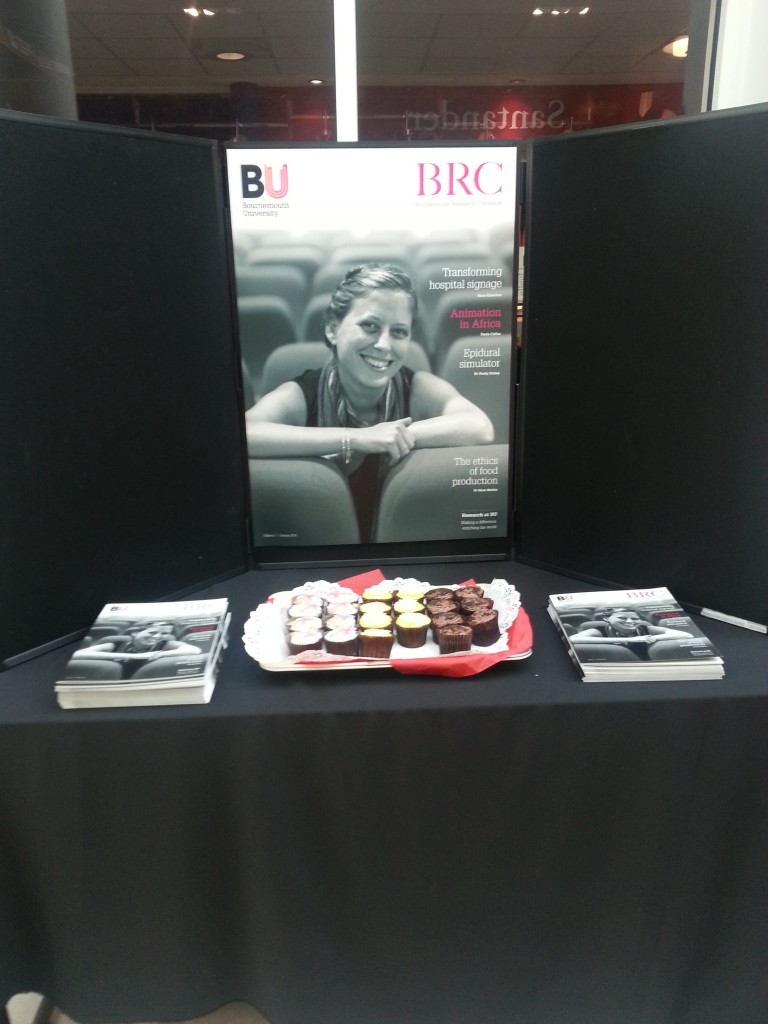
Emily Loring and I are in the Atrium, Poole House, Talbot Campus today giving out copies of the Bournemouth Research Chronicle (BRC) magazine to academic staff. Do come along and pick up a copy and have a cake with us!
We will be here until 4:30pm today (Tuesday) and again on Thursday between 9am-5pm.
Bournemouth Research Chronicle
The third edition of the Bournemouth Research Chronicle (BRC) is now published. Thank you very much to everyone who contributed.
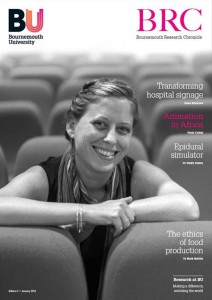
This is a glossy ‘coffee table’ magazine with some lovely images. It is aimed at peer researchers and research collaborators, prospective funders and (perhaps most importantly) research users such businesses, government organisations, policy makers and charities.
We all know that communication is an integral part of the link between research and societal impact and this magazine is a great way to get the message heard by the right people.
Content is presented through BU’s eight research themes. This edition provides a snapshot of some of the work BU submitted to the Research Excellence Framework (REF) 2014. In particular it focuses on the societal impact of our research, which forms a key part of REF2014.
Distribution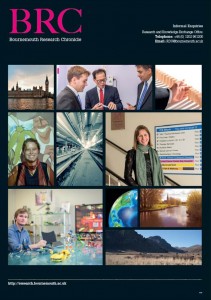
Every BU academic will receive a copy of the BRC. My colleagues and I will be in the Atrium, Poole House on Tuesday and Thursday next week with a large stash so do pop along, say hello and pick up yours. Otherwise, we’ll put it in the internal post for you.
Throughout January I’ll be sending the BRC to an extensive list of research users, including policy makers, community figures, opinion leaders, businesses and journalists. I will be providing a supply to each School so please do send it to your contacts, collaborators, peers, prospective funders, industry partners or anyone else who has an interest in BU’s research.
R&KEO will keep a larger stock of the BRC. If you would like copies for an event or conference then email me (Sally Gates – Editor) to arrange a delivery.
Thank you again to everyone who contributed and happy reading!
Knowledge Point based annotation for Open Educational Resources
Our next Creative Technology Research Centre Research Seminar will be presented by Xinglong Ma.
Title: Knowledge Points based annotation for Open Educational Resources
Date: Wednesday 15th January 2014
Time: 2 – 3PM
Venue: P302 LT
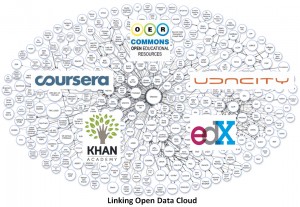
Abstract: In recent years, the emergence of open educational resources (OERs), in particularly Massive Open Online Courses (MOOCs), such as Coursera, Edx, Udacity, are making efforts to enhance openness and reuse regardless of demographic constraints. In 2011, the first course, “Introduction to AI”, from Stanford University reached 160,000 enrolments, and in the following years, millions of learners have been involved in the MOOCs. High dropout rates ensued in this self-regulated and self-controlled learning process. In order to encourage seamless learning under the open and reusable learning environment, an innovative approach is proposed based on semanticized Knowledge Points. This talk will discuss the concept of Knowledge Points and suggest the potential values of the Knowledge Points with semantics by comparing them with other annotation approaches.
ARTS in RESEARCH (AiR) Group Forming
We are pleased to announce the formation of the Arts in Research (AiR) Group. This effort grows out of the experience of HSC’s ReThink process and previous work at HSC in using tools from the Arts in carrying out research, disseminating findings and sharing them with students, colleagues and communities beyond the University. The Group is open to members of any School with an interest or even curiosity in how they might infuse their interest in the arts within more routine research and/or presentation practices.
The interest in Arts-based Research is international and growing. Areas such as video, film, photography, dance, drama, poetry, radio production, creative writing—even clowning—are becoming more mainstream. Conferences, for example, no longer routinely consist of hour-after-hour packed with 20-minute PowerPoint presentations. Young students balk at PPT and expect more creativity from lecturers in their learning experiences. Reaching wider audiences (including ‘service-users’ and the public) is now routinely demanded by funding bodies. Tools from the Arts can greatly enhance all of these efforts.
Using Arts-based approaches in research requires thinking about Method from novel viewpoints. Involving research participants in producing outputs frequently enlivens projects, for one example. Finding the right arts-based method for the research questions or findings is key to their use. Finding the right collaborator for your project can be central to its success.
The ARTS in RESEARCH (AiR) Group will begin meeting in January (watch for announcement by email, Facebook and Twitter). We will begin by exploring what interests group members have and what resources are already available. We will also explore the possibility of collaborations with working artists, so no need to feel that great personal skill is required, just enthusiasm.
Please contact Kip Jones (kipworld@gmail.com) if you are interested in joining the group.
Psychology Research Seminar: Laughing in the face of adversity – the influence of affective state on situation awareness
Venue & date: Thursday 30th January at 4pm in K103 (Kimmeridge House)
Situation awareness can be loosely defined as, ‘knowing what’s going on around you and what to do about it.’ In everyday life we make complex decisions – some good, some bad – on the basis of our awareness of what is going on around us. Sadly situation awareness can sometimes be sub-optimal leading to catastrophic errors such as road traffic accidents and air crashes. Such errors often appear to result from a ‘tunnelling down’ with available and useful information being ignored. This attentional tunnelling is widely reported by (amongst others) firefighters, medical staff and military personnel.
Dr Graham Edgar from the Centre for Research in Applied Cognition, Knowledge, Learning and Emotion at the University of Gloucestershire will present his research examining information-use in building and maintaining situation awareness, and the influence that affective state has on that process.
All are welcome and there is no need to book – just come along!
Password? Not another one!
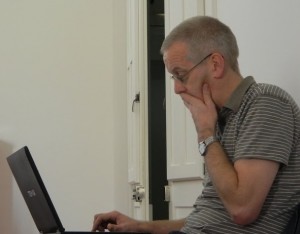
The increasing volume of academic activity on the internet coupled with a growing obsession about privacy and data protection means for many academics a rapidly expanding number of online accounts and associated passwords. This is, of course, over and above our regular dose of accounts and passwords as citizens of the virtual world. The average adult in the UK must have at least 25 internet accounts, for the bank/building society, supermarkets, phone companies, social media, airlines, trains, insurance companies, eBay, the website of the parents’ council of your children’s school, your electricity provider, the council tax, etc.
I feel as an academic, the burden is even worse. Every single time another scientific journal invites me to review a paper it opens an on-line account for me. Every time I apply for a grant from a funding body to which I have not previously applied, I am required to set up an account with a new password. When you apply for 20-odd grants every year and review manuscripts for a similar number of different journals the number of accounts and passwords add up rapidly. Then there are the other accounts and passwords related to work for sites such as this BU Research Blog, BRIAN, Survey Monkey, for the university for whom you act as external examiner, for Drop Box, the British Library, ORCIC, ACADEMIA.EDU, ResearchGate, Researchfish, Linkedin, and the list goes on.
These last few months I was reminded how non user friendly some systems are. First, I received new secure email account for my part on a REF sub-panel. The account name chosen for me is different from what I would have chosen and what I am used to at Bournemouth University. The importance of confidentiality for the REF work is clear so my password has to be different from anything I use elsewhere. Secondly, a few weeks later I attempted to put my name done for the tri-annual conference of the International Congress of Midwifery in Prague next year. It turns out you cannot join the conference without opening an on-line account first. The account name was automatically chosen for me and so was the password. Unfortunately, both are impossible to remember, neither the account name nor the password (which was case sensitive) were ones I would have selected personally.
There is some hope as some journals allow you to choose your own account name and password. Elsevier has brought most of its journals into one account, with your own email as the account name and all with the same password. Similarly a group of English-language journals in Nepal called Nepal Journals OnLine (NepJOL) use one account name for all participating journals. For the rest of my account names and passwords I can only follow the advice given by Stephen Fry on an episode of QI: “Write it down somewhere on a piece of paper”. The underlying idea is that the people who try to steal your internet account details sit in a bedsit in London or Hong Kong and won’t come to your office or living room to steal a piece of paper with computer addresses. The people who try to break into your house or office are looking for objects with a street value, such as your TV, phone or laptop, they are generally not interested in a piece of paper with some scribbles on it.
Prof. Edwin van Teijlingen
Centre for Midwifery, Maternal & Perinatal Health
The “Spirit of 13”
The outcomes of CEMP’s Spirit of 13 inter-generational research project are now online.
The screening and forum event with Ken Loach, hosted by the British Film Institute, was the outcome of a project for which people aged 25 and under produced inter-generational documentary films in response to Loach’s ‘The Spirit of ’45’. CEMP collaborated with Sixteen Films, the BFI, the Media Education Association and Media Magazine.

We are grateful to Daniel Weissman and his production crew and to Trevor Hearing, for support.
Cyber Security Seminars: Suggestions for Speakers and Topics
If you have been following my previous posts then you will know that today is the final Cyber Security Seminar for this semester. We hope you have found the seminar series interesting so far.
We are currently planning the seminars for next semester. Please get in touch if you have suggestions for potential speakers, or topics you would like to hear more about. Although the budget we have available is modest, we will do our best to accommodate your suggestions.
Cyber Security Seminar: Approaching the Measurement of User Security Behaviour in Organisations
Our final Interdisciplinary Cyber Security Seminar this semester will take place on Tuesday, 10th December at 5pm. The seminar will take place in EB202 in the Executive Business Centre, and will be free and open to all. If you would like to attend, please register at https://www.eventbrite.co.uk/e/interdisciplinary-seminar-in-cyber-security-tickets-9688353125
Our speaker will be Dr. Simon Parkin from UCL. Simon is a Senior Research Associate in the Information Security group at University College London, contributing to the Productive Security project within the Research Institute in the Science of Cyber Security (RISCS). He was previously a member of the Innovation Team at Hewlett Packard Enterprise Security Services (HP ESS) until mid-2012. From 2007 to 2011, Simon was a Postdoctoral Research Associate in the School of Computing Science at Newcastle University, where he also obtained his PhD. His research interests include: IT-security policy management metrics, models and tools; holistic IT-security management principles, and; IT-security risk management approaches and knowledge formalisation.
Abstract: Individuals working within organisations must complete their tasks, and are often expected to do so using secured IT systems. There can be times when the expectations for productivity and security are in competition, and so how would an organisation measure the outcomes in practice? We will review a series of interdisciplinary research efforts that characterise the human factor in IT-security within large organisations, as part of a holistic view of security. There are furthermore a variety of modelling approaches and frameworks that have emerged and informed this view. We will consider the challenges that remain in affording measurement of the human factor in IT-security within organisations, and some of the changes that are required for such activities to be sustainable and effective.
Upcoming Event: Managing Media Innovation with Dr John Oliver
The Centre for Entrepreneurship is delighted to invite you to a presentation by Dr John Oliver from the Media School on 20 January 2014 at the Executive Business Centre. Arrival from 5:30pm for a 6pm start.
Dr John Oliver is Deputy President of the European Media Management Association along with being Programme Director for the Professional Directorate in the Creative Industries at Bournemouth University. Dr John Oliver has delivered executive education to clients including Virgin Media and BskyB.
Businesses increasingly find themselves competing in highly changeable and dynamic markets. Visibility is limited, and the strategic way forward is ambiguous to say the least. Dr John Oliver will present and discuss the latest findings on how UK media firms are managing media innovation over the short and long-term.
Please join us for this free event. Local businesses and students will also be attending so it is a great opportunity for networking / public engagment!
Refreshments will be provided, to find out more or to book your place please visit http://bucfe.com/events/managing-media-innovation/
Media and Information Education in the UK: Recommendations to the European Union
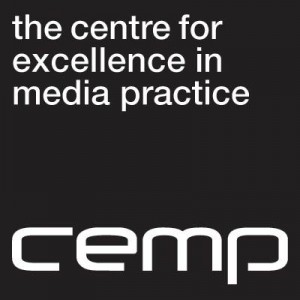
Dr Julian McDougall from BU’s Centre for Excellence in Media Practice (CEMP) will make recommendations on UK media education at a conference in Paris later this month.
The conference brings together comparative analyses on media and information education from EU member states and Dr McDougall will present the UK report alongside his London School of economics (LSE) research collaborators.
Dr McDougall said: “In the UK report, we have mapped media education provision in the UK against the various EC and EU frameworks and draw a clear conclusion, that the UK is rich with expertise, energy and leadership for media and information education, and to a significant extent is the envy of other European nations in this respect, but deeply entrenched prejudice against ‘media studies’ means that promoting media literacy through schools is continually undermined.”
The report examines the progression of media education through three key phases:
- Pre-OFCOM: the establishment of Media Studies, Film Studies and other related areas in the curriculum.
- 1997 – 2011 New Labour Government and OFCOM media literacy intervention with some correspondence to Media Studies
- Post-OFCOM Coalition Government, discontinuation of media literacy strategies
When examining the current ‘state of play’ in UK media literacy education, Dr McDougall and his colleagues looked at four areas: the study of media in formal secondary and higher education through curriculum subjects such as Media Studies, Film Studies and Media/non-literary textual analysis in English as well as vocational courses; broader, less formal examples of media literacy across the UK curriculum and extra-curricular activities such as literacy education in primary schools and related subjects like Citizenship, Sociology and History; e-safety policies in the school system; and media & information literacy outside of formal education.
Having examined the current scope and provision of UK media education and media literacy, the report identifies a scarcity of funding and training and a contradiction between support for creative industry employability, digital literacy and e-safety and derision towards, neglect of and undermining (through UCAS tariff distinctions, for example) media education where it already exists for thousands of young people.
At the same time, the recent Next Gen Report, well received by policy-makers, fails to locate media education as a context for teaching digital programming and coding. The UK report predicts that the combined effect of proposed secondary curriculum reform and this response to the Next Gen report will place UK media education in further ‘limbo’ between the cultural value afforded to English Literature and Art as academic /creative disciplines for their own sake and the vocational importance of strong media and technological literacy, such as those assumed for games and effects education within the STEM subject cluster, in today’s modern media-saturated tech-savvy workplace.
Three clear and compelling recommendations are presented from the UK report’s findings:
- The model of media literacy currently provided by the various EU and EC strategies is too broad in scope and ambition for mainstream education to ‘deliver’ and therein lies a fundamental mismatch between the objectives of media literacy as articulated in policy and the capacity of education as the agent for its development in society
- To coherently match Media Studies in the UK to the policy objectives for media literacy expressed in European policy, Government funding (for teacher training), support and endorsement for Media Studies is essential
- Funding should be prioritised for broader research into the capacity for Media Studies in schools and colleges to develop media and information literacy as defined by the European Union.
The conference is hosted by the French National Research Agency project TRANSLIT (convergence between computer, media and information literacies), in association with the European network COST “Transforming Audiences/Transforming Societies.” It takes place on 13-14 December at the Grand Amphi of Sorbonne Nouvelle University, Paris.
Dr McDougall was lead author on the report, entitled Media and Information Education in the UK, alongside his LSE collaborators Professor Sonia Livingstone (Leader of the TRANSLIT/COST Media Literacy Task Force) and Dr Julian Sefton-Green.

CEMP Bulletin
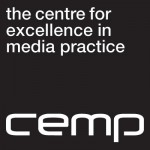
Here is the updated CEMP bulletin for December 2013.
Please contact Julian McDougall to follow up any of these opportunities or to share other ideas for pedagogy/ practitioner research.
Bangkok conference “a big success”
Speakers and delegates from 10 mainly Asian countries voted the 1st International Corporate and Marketing Communication in Asia Conference, held in Bangkok on November 18-19, “a big success”
The FIF-supported conference went so well that planning is already under way for the 2014 conference, also to be held at Chulalongkorn University in the Thai capital.
Representing BU at the conference were Prof Tom Watson, a co-organiser, and Dr Ana Adi, both of the Media School. Tom was a second day keynote speaker while Ana presented the outcome of research by her and Nathaniel Hobby on social media monitoring in higher education.
The conference, held at the Faculty of Communication Arts, was opened by the host’s Vice-President, Assoc Prof Dr Sittichai Tudsri. Including the Thai and UK organisers, 30 papers were presented by academics from Australia, Egypt, Germany, Hong Kong, India, Indonesia, Malaysia, and Singapore.
“The conference especially sought Asian perspectives: alternatives to Anglo-American models of theory, practice and education. In this aspect it succeeded to everyone’s satisfaction,” Prof Watson said. “I believe that several international joint research projects will develop from the 2013 conference, which is also a major step forward.”
He said that delegates had welcomed the conference as filling a major gap in corporate and marketing communication academic discourse in Asia. “This reflected well on BU and I’m grateful for the FIF support that helped us devise and develop the conference. It’s an investment that has long term reputational and research value.”
Already, a Media School team researching CSR has linked with colleagues at Chulalongkorn University and a further connection with an Indonesian researcher may follow soon. The BU-Chula link was confirmed at the conference.


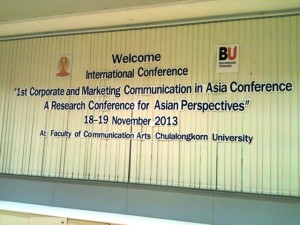












 Beyond Academia: Exploring Career Options for Early Career Researchers – Online Workshop
Beyond Academia: Exploring Career Options for Early Career Researchers – Online Workshop UKCGE Recognised Research Supervision Programme: Deadline Approaching
UKCGE Recognised Research Supervision Programme: Deadline Approaching SPROUT: From Sustainable Research to Sustainable Research Lives
SPROUT: From Sustainable Research to Sustainable Research Lives BRIAN upgrade and new look
BRIAN upgrade and new look Seeing the fruits of your labour in Bangladesh
Seeing the fruits of your labour in Bangladesh ECR Funding Open Call: Research Culture & Community Grant – Apply now
ECR Funding Open Call: Research Culture & Community Grant – Apply now ECR Funding Open Call: Research Culture & Community Grant – Application Deadline Friday 12 December
ECR Funding Open Call: Research Culture & Community Grant – Application Deadline Friday 12 December MSCA Postdoctoral Fellowships 2025 Call
MSCA Postdoctoral Fellowships 2025 Call ERC Advanced Grant 2025 Webinar
ERC Advanced Grant 2025 Webinar Update on UKRO services
Update on UKRO services European research project exploring use of ‘virtual twins’ to better manage metabolic associated fatty liver disease
European research project exploring use of ‘virtual twins’ to better manage metabolic associated fatty liver disease